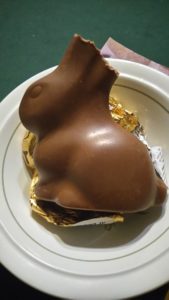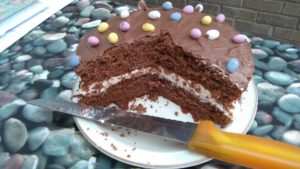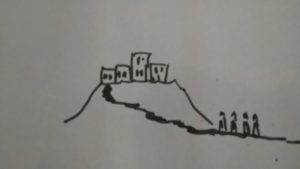What are those for? This has been a recurring question since I left home to take part in the Easter weekend in Wales with the Lay Community of St Benedict. No, not what are Lay Benedictines for, but what are these wooden trays full of holes for, that I am carrying?
It seems that Communion trays, which is what they are, are not a common sight on public transport in these parts. But they are an interesting talking point, both in the Lay Community and beyond.
I brought the Communion trays from school for the Easter Sunday service which was described on the leaflet as Ecumenical.
I was cheerfully told that the Sunday morning service on these occasions was usually chaotic. And that was before I started.
We did some RB, remembered Bible. We made a table into a tomb with a black cloth. We talked to each other about what it might have been like to go to the tomb early in the morning. Some of the things mentioned were
It was women that went first and we were not surprised;
When the men followed, they had a race;
It was warming up outside but it was cold inside the tomb – this was a physical thing we’d notice;
When we saw the tomb was empty we were surprised, fearful, confused and had ‘other feelings difficult to put into words ‘
We all came to look in the tomb. I’d noticed that LCStB liked to move around in worship so I shouldn’t have been surprised when most got up to look. A little girl called Mary went inside and reported that the cloths she found there folded up were very soft.
Later we had a second bite at RB when we thought about left overs. Could we remember any stories from Jesus’ ministry about left overs? If course we could – loads.
The most common one was feeding the five thousand and the baskets of left overs.
One person suggested the catch of fish. First there were no fish and then the second time there were more fish.
The syrophonecian woman was remembered for her remark about the crumbs under the table; a remark showing the faith of an outsider, or one left over.
Turning the water into wine reminded us that the best had been ‘kept until last’.
The parable of the barns, suggested that rather than keeping lots for ourselves we should give more away in the first place.
In the Passover story we remembered that there were to be no left overs, and in the wilderness the people were not to keep the left over Manna. This was interesting as Jesus’ last supper was about making a new story from the left overs of the old, using the left overs from the Passover meal to make a new meaning of his body and blood.
All this and more came out from our shared RB.
Towards the end we heard that the rejected and left over stone became the new cornerstone: Christ himself. At his Ascension we became the left over people charged with the mission of taking the message to all people. For this the left over people received the left over Holy Spirit: my Spirit I give you.
Our task to be left overs, is to be scattered in our communities where it seems, Jesus thinks left overs are enough to feed the world.
During our sharing many members of the community, young and old, women and men, found their voice and became theologians. Someone asked Is it the homily? Call it what you like, we did it together.
After that we shared the bread we’d made and the small cups from the communion trays. For some this was the first time of celebrating Communion in this way.
The whole thing was fairly chaotic and certainly full of holes, but it seemed to feed us all and send us out with more to share.
In our life and our believing
The love of God


